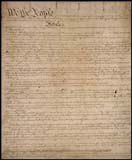| >US/AZ
Government
>World History
>Nogales
High School Web Page
Class
stuff...
>A
letter to my students
>Course
Guide in PDF
>Photos
of Old Nogales
>Socartic
Seminar Grading
>The
Habits of Mind, Heart and Effectiveness
>Position Papers
Constitution
Info
>The Founders'
Constitution
>The Federalist
Papers
>Constitution Basics
>The Constitution Society
>Arizona Legislature
>Alexis de Tocqueville, Democracy in America
|


Writing Position Papers and Principles of U.S. and AZ Constitutions |
|
| 8/31 to 9/2 |
- Writing Position Papers
In-class reading articles on to prepare for the position paper
- ASSIGNMENT:
POSITION PAPER
EQ: "Is health care a right that should be protected by the government?"
or
EQ: "Should the First Amendment protect atheists?"
- Student/teacher interviews.
|
| 9/3 and 9/4 |
- Explanation of EQs
- Lecture Principles
- Define and give examples
- Enlightened Self Interest and the Common Good
- Liberty
- expression
- due process
- arms
- Federalism/Tenth Amendment
- Republicanism
- Limited Government
- Rule of Law
- Judicial Review
- Separation of Powers/Checks and Balances
- Equal Protection/Fourteenth Amendment
- Current events examples
- Constitutional Principles Applied Work Sheet
- Principles and Constitutional Reference Notes sheet
|
| 9/7 |
|
| 9/8 and 9/9 |
- Senior Exhibition Project Proposal and Senior Project Video
- Turn in Project Proposal by 9/13 to nicenet
|
| 9/10 |
- Foundations of Democracy
Work sheet and class discussion - 4.1a
- Virginia Declaration of Rights 4.1b and 4.1c
- Declaration of Independence 4.2a
The Preamble to the Constitution 4.2b
- Turn all work sheets
|
|
"Live free or die" |
| 9/11 |
- Liberty or Safety T-chart
- 9/11/01 - What happened - What it means
- The Patriot Act
- Reaction to the Patriot Act
- Examples of Patriot Act Changes in Security
- Checks and balances impact
- Commander in chief examples
|
| 9/14 |
- Liberty and Security Position Paper Due 9/15/09
- E-Journal Questions: DUE 9/13/09
- What did Machiavelli mean when he said, "Good laws follow good armies."?
- What is meant by the idea that once a people give up their rights they must fight to get them back it's easier to let the go than to protect them. How does the Declaration of Independence state this idea?
- 9/11.video
|
AZ ENGLISH LANGUAGE LEARNER (ELL) PROFICIENCY STANDARDS
LISTENING AND SPEAKING
• Communicate effectively and confidently in most practical, social, and academic settings, including obtaining, exchanging, and presenting feelings, observations, information, feedback, ideas, and opinions. |
Government Standards this unit
Concept 1: Foundations of Government
The United States democracy is based on principles and ideals that are embodied by symbols, people, and documents. |
High School |
PO 1. Examine the foundations of democratic representative government:
- Greek direct democracy
- Roman republic
|
PO 4. Examine the fundamental principles (e.g., equality, natural rights of man, rule of law) in the Declaration of Independence. |
Concept 4: Rights, Responsibilities, and Roles of Citizenship
The rights, responsibilities and practices of United States citizenship are founded in the Constitution and the nation’s history. |
|
PO 1. Analyze basic individual rights and freedoms guaranteed by Amendments and laws:
- freedom of religion, speech, press, assembly, and petition in the First Amendment
- right to bear arms in the Second Amendment
- Ninth Amendment and guarantee of people’s unspecified rights
- civil rights in the Thirteenth and Fourteenth Amendments
- voting rights in the Fifteenth, Nineteenth, Twenty-third, Twenty-fourth, and Twenty-sixth Amendments; Native American citizenship and voting rights (Arizona, 1948); Voting Rights Act of 1965
- conflicts which occur between rights (e.g., the tensions between the right to a fair trial and freedom of the press, and between majority rule and individual rights)
- right to work laws
|
PO 2. Define citizenship according to the Fourteenth Amendment. |
PO 4. Demonstrate the skills and knowledge (e.g., group problem solving, public speaking, petitioning and protesting) needed to accomplish public purposes. |
PO 5. Describe the role and influence of political parties, interest groups, and mass media:
- political perspectives (e.g., liberalism, conservatism, progressivism, libertarianism)
- influence of interest groups, lobbyists, and PAC’s on elections, the political process and policy making
- influence of the mass media on elections, the political process and policy making
|
|
|
